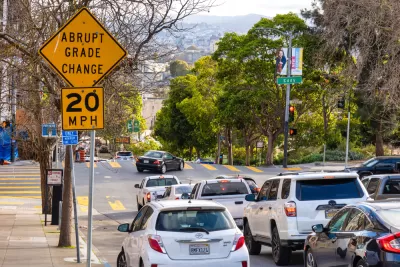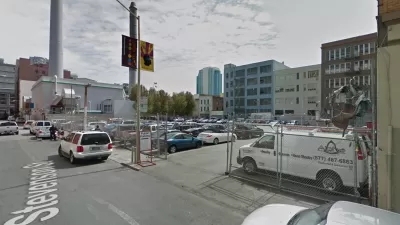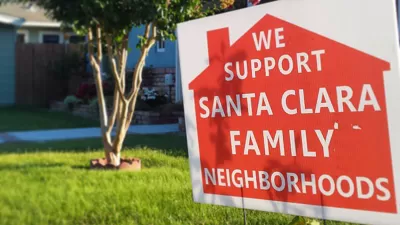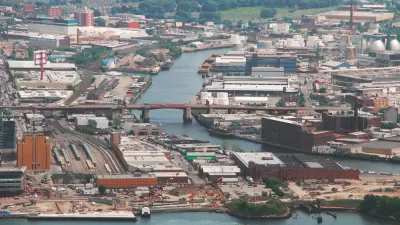A spate of recent articles has taken a critical look at the regulatory obstacles to a progrssive planning vision in the state of California.

From both ends of the nation's most populous state, come articles in major local newspapers about the sources of California's regulatory frustrations for the development market—the various forms of local veto available to local interests with the time and resources available to derail housing and transportation development plans.
First, for the Los Angeles Daily News, Anthony Dedousis writes an opinion piece to criticize the variety of regulatory obstacles available to NIMBYs in the state's largest city.
You have to hand it to Los Angeles’ NIMBYs: they’re endlessly creative at finding new reasons to oppose more housing.
Apartment buildings create traffic. They hurt property values. They attract “the wrong element”. They spread COVID-19. They will (gasp!) cast a shadow.
Now, they’re using historic preservation as a gambit to block new housing.
The focus of Dedousis's complaint is to criticize the abuses, while acknowledging some of the successes, of the city's many tools of historic preservation (e.g., the city's Historic-Cultural Monument program and its Historical Preservation Overlay Zones). The latest abuse, according to Dedousis: "the situation on Orange Grove Drive in Mid-Wilshire, where the owner of an aging duplex proposes to build a 16-unit apartment building in its place. The project qualifies for a streamlined approval process because it reserves two units for lower-income households, making it difficult for unhappy neighbors to halt the project. In response, a group of residents began a campaign to get the duplex declared historic."
Shifting this theme farther north, and to a different mode of development, Heather Knight has written a pair of articles for the San Francisco Chronicle on the forms of regulatory frustration available to development opponents in San Francisco. The first article criticizes the ability of a small number of individuals to block eco-friendly transportation projects, even amidst a climate crisis made evident by orange skies and seemingly endless days of smoky air over the course of the past month.
And yet in supposedly environmentally conscious San Francisco, we’re fighting over bike lanes and prohibiting through traffic on a tiny percentage of our streets. Even though making it easier and more appealing for people to leave their cars at home to walk, bike, carpool or take public transit instead is one of the main ways cities can fight climate change.
Knight names names, just two people (in a city of 800,000) with a long track record of opposing innovative transportation planning ideas from implementation, and a more recent track record of frustrating the city's response to the pandemic
Because of them, the next phase of the Slow Streets program is on hold. That program shuts some streets to through traffic so people can walk and bike safely while social distancing. Temporary emergency changes to streets to make way for coronavirus testing sites and pop-up food pantries are also on hold.
The regulatory tool leveraged by the two individuals in question: the California Environmental Quality Act. At least the status quo could be changing soon: "State Sen. Scott Wiener has legislation awaiting the governor’s signature that would exempt some public transportation projects and bike and pedestrian safety improvements from CEQA review, but it won’t go into effect until Jan. 1," reports Knight. (The legislation referenced here is SB 288, covered by Planetizen in June 2020.)
A few days later, Knight took again to the pages of the Chronicle to report that the previous column had produced a response from local political leaders, including Mayor London Breed, who committed to ending the ability of a small number of individuals to endlessly delay projects intended for the benefit of the public. Breed's words on Twitter offer proof of this commitment.
In the middle of a climate emergency, with our city experiencing weeks of dangerous air quality, there is no reason to subject important transit improvements to unnecessary delays.
But this isn't just limited to transit.https://t.co/4B5dmp6n5k— London Breed (@LondonBreed) September 12, 2020
Knight also reports in the follow up column that Breed has directed the city's planning department to craft a proposal to streamline the appeals process with the hope of putting forward legislation to the San Francisco Board of Supervisors soon.

Alabama: Trump Terminates Settlements for Black Communities Harmed By Raw Sewage
Trump deemed the landmark civil rights agreement “illegal DEI and environmental justice policy.”

Planetizen Federal Action Tracker
A weekly monitor of how Trump’s orders and actions are impacting planners and planning in America.

How Atlanta Built 7,000 Housing Units in 3 Years
The city’s comprehensive, neighborhood-focused housing strategy focuses on identifying properties and land that can be repurposed for housing and encouraging development in underserved neighborhoods.

In Both Crashes and Crime, Public Transportation is Far Safer than Driving
Contrary to popular assumptions, public transportation has far lower crash and crime rates than automobile travel. For safer communities, improve and encourage transit travel.

Report: Zoning Reforms Should Complement Nashville’s Ambitious Transit Plan
Without reform, restrictive zoning codes will limit the impact of the city’s planned transit expansion and could exclude some of the residents who depend on transit the most.

Judge Orders Release of Frozen IRA, IIJA Funding
The decision is a victory for environmental groups who charged that freezing funds for critical infrastructure and disaster response programs caused “real and irreparable harm” to communities.
Urban Design for Planners 1: Software Tools
This six-course series explores essential urban design concepts using open source software and equips planners with the tools they need to participate fully in the urban design process.
Planning for Universal Design
Learn the tools for implementing Universal Design in planning regulations.
Jessamine County Fiscal Court
Caltrans
Institute for Housing and Urban Development Studies (IHS)
City of Grandview
Harvard GSD Executive Education
Toledo-Lucas County Plan Commissions
Salt Lake City
NYU Wagner Graduate School of Public Service





























